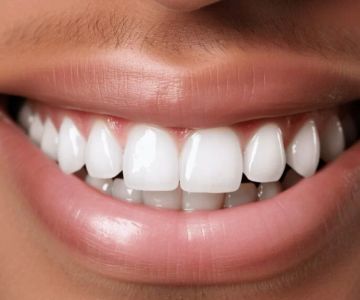Oral Hygiene: The Foundation of a Beautiful Smile
Oral health is not just about having a set of shiny teeth; it's a crucial aspect of overall well-being. Maintaining good oral hygiene is the key to a bright, confident smile and a healthy body. In this comprehensive guide, we'll explore the various tips and strategies that can help you achieve and sustain optimal oral health.
Brushing Techniques for a Thorough Clean
Brushing your teeth properly is the first step towards a healthy mouth. It's recommended to brush your teeth at least twice a day, preferably in the morning and before bed. Choose a soft-bristle toothbrush that is gentle on your gums and teeth. An electric toothbrush can be a great option as it often provides more thorough cleaning. When brushing, hold your toothbrush at a 45-degree angle to your gums and use gentle, circular motions to clean each tooth's surface, including the front, back, and chewing surfaces. Don't forget to spend a full two minutes brushing to ensure a comprehensive clean. Also, remember to brush your tongue to remove bacteria and freshen your breath.
The Importance of Flossing Daily
Flossing is an often overlooked but essential part of oral hygiene. Make it a daily habit as it helps prevent cavities and gum disease by removing debris from between your teeth. Use about 18 inches of floss and gently slide it between your teeth. Curve the floss into a C-shape around each tooth and carefully glide it up and down to remove plaque and particles.
Choosing the Right Mouthwash
Opt for an antimicrobial or fluoride mouthwash. Antimicrobial mouthwashes kill bacteria, while fluoride mouthwashes help strengthen enamel and prevent cavities. Always read and follow the instructions on the mouthwash label. Rinse for the recommended amount of time and avoid eating or drinking immediately afterward.
Smart Eating Choices for Oral Health
Limit your consumption of sugary and acidic foods as they can contribute to tooth decay. Instead, choose snacks like fruits, vegetables, nuts, and dairy products, which promote saliva production and help neutralize acids in the mouth. Drinking water frequently helps wash away food particles and bacteria, promoting a healthier mouth.
The Significance of Regular Dental Check-ups
Regular dental check-ups are non-negotiable for maintaining a healthy smile. Aim for dental check-ups every six months. Your dentist can identify and address potential issues before they worsen. Professional dental cleanings remove stubborn plaque and tartar buildup that regular brushing and flossing might miss.
Harmful Habits to Avoid
Certain habits like smoking and nail-biting can have detrimental effects on your oral health. Smoking increases the risk of gum disease, tooth decay, and oral cancer. Nail-biting can damage your teeth and lead to chips or cracks.
Selecting the Right Toothpaste
Look for fluoride toothpaste as it helps strengthen enamel and prevent cavities. If you have specific needs such as sensitive teeth or gum issues, consider toothpaste formulated for those concerns.
Teaching Children Good Oral Hygiene
Start teaching your children about good oral hygiene habits from a young age. Supervise young children with brushing and flossing until they can do it effectively on their own. Make the experience enjoyable by using colorful toothbrushes, entertaining toothpaste flavors, and even playing music.
Consistency is Key
Be consistent with your oral hygiene routine. It's the key to achieving and maintaining good results. Listen to your dentist's personalized advice based on your specific oral health needs. Prioritize your oral health as it is an integral part of your overall health and well-being. Remember, a bright and healthy smile is within your reach with the right knowledge and commitment to oral hygiene.
In conclusion, maintaining a bright smile through proper oral health education involves a combination of daily practices such as effective brushing, flossing, and using the right products, along with making smart dietary choices and scheduling regular dental visits. By avoiding harmful habits and instilling good oral hygiene in children from an early age, you can ensure a lifetime of healthy and beautiful smiles. Prioritizing oral health is not only about aesthetics but also about preventing serious health issues and enjoying a better quality of life.

 Absolute Dental - Lake Mead
Absolute Dental - Lake Mead Smiles Dental Milwaukie
Smiles Dental Milwaukie Dr. Brock F. Tekin, DMD
Dr. Brock F. Tekin, DMD Ryan L. Lindner, DDS
Ryan L. Lindner, DDS Prosthodontic & Implant Associates
Prosthodontic & Implant Associates Westlake Family Dentistry
Westlake Family Dentistry The Importance of Oral Health Education During Pregnancy for a Healthy Pregnancy
The Importance of Oral Health Education During Pregnancy for a Healthy Pregnancy Why Skipping Dental Checkups Can Lead to Bigger Oral Health Problems
Why Skipping Dental Checkups Can Lead to Bigger Oral Health Problems Advantages of Porcelain Dental Restorations
Advantages of Porcelain Dental Restorations Best Tips for Brushing Your Teeth Properly for Healthy Gums: Essential Techniques for Oral Health
Best Tips for Brushing Your Teeth Properly for Healthy Gums: Essential Techniques for Oral Health How Can Diabetes Cause Tooth and Gum Problems? Preventing and Managing Oral Health Issues
How Can Diabetes Cause Tooth and Gum Problems? Preventing and Managing Oral Health Issues Healthy Habits for Promoting Good Oral Health and Hygiene: Tips for a Healthy Smile
Healthy Habits for Promoting Good Oral Health and Hygiene: Tips for a Healthy Smile